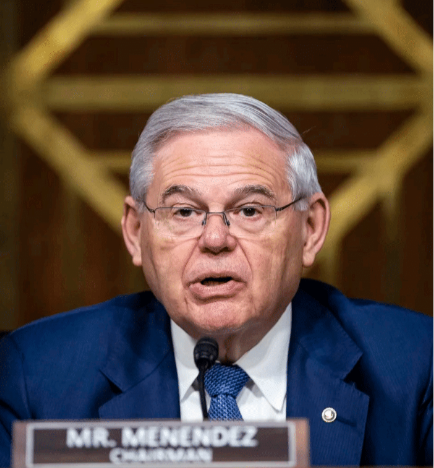Kash Jain ’26
Opinion Editor
On Friday, Sept. 22, the U.S. Attorney’s Office for the Southern District of New York announced bribery charges against Senator Robert “Bob” Menendez. The New Jersey Democrat allegedly received cash, gold bars and a Mercedes Benz in return for using his position to protect New Jersey businessmen from legal trouble and support the Egyptian government’s interests.
The charges against Menendez, who chairs the Senate Foreign Relations Committee (SFRC), are certainly troubling, compounded by the fact that this appears to be a pattern. In 2015, Menendez faced similar charges after he allegedly directed State Department officials to pressure the Dominican Republic’s government to enforce a contract that would benefit a close friend — Florida-based ophthalmologist Salomon Melgen — who later donated to his campaign in return. Menendez was also accused of personally intervening to secure visas for Melgen’s girlfriends and receiving over $750,000 in return.
In 2018, after a mistrial due to the jury’s inability to reach a verdict, the charges were dropped. Following this, the Senate Ethics Committee issued Menendez a Public Letter of Admonition, stating that he had violated Senate rules and federal law by repeatedly accepting and failing to report gifts and by misusing his office to advance Melgen’s interests.
These allegations are serious, particularly because they are not ordinary crimes. What sets bribery apart from many legal issues is that it directly involves the office that the accused holds. This is not a crime that an ordinary civilian can commit — it’s one reserved for those who wield power. It requires that such an individual actively misuses their position to deliver action that would otherwise not occur.
An individual who makes a bribe is committing a serious crime; an individual who solicits or accepts a bribe is committing a serious crime, but they’re also betraying their office and those who put them there. Trading on influence, even if it only directly involves a few people, has implications for many, particularly when policy decisions are the focus. In placing oneself over the people and duties of one’s office, an elected official who takes bribes and reciprocates with action isn’t harming an individual but all the people that they represent. In some cases, one who directs action in favor of their personal interests may go even further and directly harm the interests and security of their constituents.
Bribery isn’t uniquely wrong, but it does belong to a unique class of crimes; the Constitution acknowledges this, listing bribery and treason as two “high crimes and misdemeanors” that can be grounds for removal from office. High crimes, as the Founding Fathers understood them, were those that could only be committed by government officials; while there were disputes regarding exactly what would count as a high crime, there were some who felt that such a crime involved betraying public trust, the responsibility granted to elected officials by the people who elected them. Alexander Hamilton held that conduct that would violate public trust would do harm to society itself. These crimes, again, are not simply between two people; they involve this position of power and responsibility that one has been explicitly granted and thus harm those who granted it.
Menendez, for the second time, is accused of misusing his position for personal gain. He has allegedly misused his position as a Senator and as Chairman of the SFRC. If the accusations are accurate, he has used the influence he holds over foreign policy to directly shape policy towards the Dominican Republic and Egypt, both times for the benefit of himself and those around him. As both states are allies, there’s no serious threat to domestic security or the interests of Americans from these actions, but using a position such as SFRC chair to influence policy both within and beyond the nation’s borders would be a grave offense.
This is not to suggest that Menendez is guilty of such — however, legitimate concerns that he may have accepted bribes warrant strict action.
The presumption of innocence is an integral part of the justice system, and Menendez deserves the chance to present evidence and make his case against these charges. However, someone who is under suspicion of taking bribes cannot be trusted to remain in public office — even if they are innocent, the potential cost of allowing them to retain that position while proceedings are underway is too high to risk. Therefore, given the severity and nature of these allegations, Senator Menendez should resign.
Menendez seems to recognize the severity of these concerns and has stepped down as SFRC Chairman. However, even without chairing the committee, he has significant influence over foreign policy, which, if the claims are true, he has already directly misused to enrich himself. Stepping down as SFRC Chair is the right call and indicates that he is willing to act in good faith; however, that is not enough. This is an individual who will wield immense power so long as he holds a government office, and whether he can be trusted with this — particularly as it relates to defining American foreign policy — is being directly called into question. The risk of maintaining his influence is too great.
Resigning would be a serious, irreversible measure. It is not quite the same as a temporary suspension or limitation that could come with certain crimes — it’s not a preliminary injunction meant to bar action while the court proceeds, there’s no such measure for situations like this. As such, it’s easy to understand why Menendez has said that he would not step down from the Senate. If his personal conduct was all that was being called into question, perhaps remaining in his position would be a more defensible decision. However, when the public trust is in jeopardy — when a powerful individual is suspected of having misused their power — serious measures are necessary.
Menendez has had a remarkable career, and his decades of service to the people of New Jersey have undoubtedly left a positive impact. There’s no question that he should be afforded a fair trial. However, the gravity of these allegations impairs his ability to serve the people of his state and the nation’s foreign policy interests and implicates the responsibility placed on him; as such, it is best that he resigns his position as a senator.






+ There are no comments
Add yours